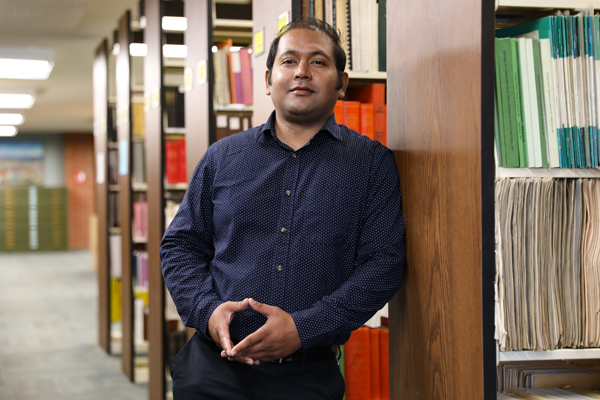Montana Technological University researcher will receive a $199,927 grant from National Science Foundation

An assistant professor of mechanical engineering at Montana Technological University will receive a $199,927 Engineering Research Initiative (ERI) grant from the National Science Foundation.
Dr. Md Nahid Hasan received the award for his proposal, “Harnessing Chaotic Dynamics for Remote Morphing of Magnetic Metamaterials.”
“It is an incredible honor for Dr. Nahid and Montana Tech to receive an ERI award from the National Science Foundation,” Vice Chancellor for Research and Dean of the Graduate School Dr. Angela Lueking said. “The ERI award is prestigious, select, and competitive -- designed to build research capacity for young investigators at smaller institutions such as Montana Tech.”
The National Science Foundation awards ERI grants to scientific researchers at non-R1 institutions of higher education. These researchers work in engineering fields and have not yet received sufficient federal research funding.
“I was absolutely thrilled and honored to receive the ERI grant from the National Science Foundation,” Nahid said. “It’s incredibly encouraging to have this work recognized, and I’m excited about the possibilities it opens up for research and student involvement here at Montana Tech.”
Nahid’s project focuses on developing a new type of architected material that can change its shape when exposed to magnetic fields that switch on and off. These materials—known as mechanical metamaterials—are designed to morph between different stable shapes in response to magnetic actuation.
“Most existing shape-changing materials require constant energy input to maintain or change shape, which can be energy inefficient. Instead, we’re exploring how small, repeating (oscillating) magnetic signals can trigger these shape changes using very little energy,” Nahid said.
“What makes this work unique is our focus on soft, rubber-like materials embedded with magnetic particles,” he continued. “These materials are engineered to have multiple stable forms, and our goal is to make them flip between these shapes quickly, efficiently, and without continuous power. By doing so, we hope to enable new technologies like flexible medical devices, deployable structures for space missions, and smart infrastructure systems.”
This project builds on Nahid’s previous research in mechanical metamaterials and nonlinear dynamics and chaos.
“What makes it exciting is its potential application in medical robotics and soft robotics,” Nahid said. “It’s a great opportunity to combine advanced manufacturing, experimental work, and fundamental science—while also engaging students directly in cutting-edge research.”
The project will support student training and outreach through workshops for students in kindergarten through 12th grades. Nahid aims to inspire and involve the next generation of undergraduate and graduate students at Montana Tech.
Nahid is currently seeking both undergraduate and graduate students to join his lab and contribute to this project.
“It's a great opportunity for students interested in mechanical metamaterials, smart materials, and hands-on research in a collaborative environment,” Nahid said.